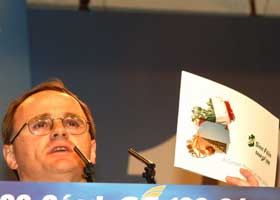10 March 2005 Edition
Advancing towards Irish unity
BY ROISIN DE ROSA

Barry McElduff
The all-Ireland agenda section, which came immediately before the Presidential address on Saturday, was a key section of the Ard Fheis. It dealt with the commitment of the party to advance the campaign calling on the Dublin Government to start building towards Irish unity and it dealt with resolutions endorsing the all-Ireland Agenda projects to initiate widespread consultations to engage communities in framing the New Ireland they want to achieve.
Martin McGuinness introduced the session. "Sinn Féin has a political agenda," he said. "It is an agenda of change which requires a new type of political activism." He went on, "The Good Friday Agreement was not a republican document but it has opened up the political space for republicans to build towards Irish unity and to move beyond the partitionism that characterises every other political party on this island."
He went on to talk of the Human Rights Commission, set up under the GFA and the promise of an all-Ireland Bill of Rights, on which the two governments have stalled, which would enable social and economic rights for all — the rights of workers, of the disabled, of ethnic minorities, women, the sick, the children and all those disadvantaged simply through poverty.
"This is why the party has engaged in a consultation with the social partners from grassroots to national level, with the aim of building a broad front demanding the implementation of this promise. Republicans need to link their work for Irish unity with this demand for rights. We need to go out there and engage with people to build a demand for all of this amongst all those groups who look for rights to be vindicated in the New Ireland."
He went on to talk of the importance of the Green Paper and the imperative to engage with business interests, trade unions, communities and NGOs in strengthening this demand for unity, given the failure of others to undertake this work. As a part of this nationwide debate "we must engage with unionists and allow them to participate on their own terms.
"Significantly, the DUP, in the negotiation running up to last December, signed up for the alI-Ireland agenda set out in the GFA and began a constructive engagement with the Irish government and with nationalist opinion for the first time," he said. "I welcome these tentative but significant first steps."
"By campaigning for an all-Ireland approach to the achievement of popular democracy we are campaigning for Irish unity. By delivering on all-Ireland social and economic integration and campaigning to address human rights, we move closer to political unity."
Martin's statement was taken up by those who work on the All-Ireland agenda project, headed up by Martina Anderson. Martina, quoting Connolly, said: "Two currents of revolutionary thought in Ireland, the socialist and the nationalist, are not antagonistic but complementary."
"The All Ireland Agenda is the crux of what Sinn Féin is about as a party. It seeks to bring forward the issue of Irish reunification in a manner that builds participation into the heart of governance. It is to empower the people themselves.
"It is only through discussing the opportunities and building support for these ideas that we will make change a reality. That means building broad alliances in civil society to change the status quo, to end corruption, the abuse of rights, inequity and ending the brown envelope culture permanently on this island."
Damien McIlroy spoke of the progress made by councillors in the border regions in advancing the initiative to de-construct the border. He talked of the recent launch of AONTU, a group of councillors working together with political activists to bring effective integration. "Sinn Féin must seize the time, seize the opportunity to bring down the border," he said.
Councillor Brian McKenna from Monaghan spoke of the negative impact of the border on social and economic conditions that have damaged business interests and of Sinn Féin's commendable work to advance the work of the Implementation Bodies.
Damien Daly and Barry McNally, both from Ógra, spoke to their resolutions calling for an extension of the franchise to include all Irish citizens in Presidential elections.
In a characteristically witty speech, Barry McElduff, MLA from Tyrone, called on "my friend, the Taoiseach, to commission his Green paper, and my friend, Peter the Great (Peter Canavan) to have a vote in Presidential elections" at which point he was interrupted by the Chair, Declan Kearney, who mentioned that Barry should not believe that this would ensure that 'Sam' is coming back to Tyrone shortly - an interchange almost drowned out by applause and laughter, which did not detract one bit from the importance of the debate.
